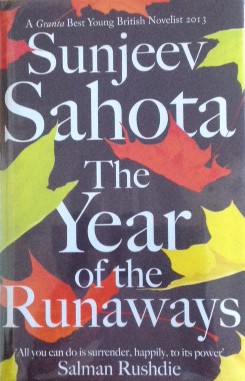Inspiring Older Readers
 posted on 25 Mar 2016
posted on 25 Mar 2016
The Year of the Runaways by Sunjeev Sahota
Towards the end of this beautifully written but sometimes harrowing story, Narinder who is the main female character reflects ' Who would be a man ... in a world like this?' Actually she has a pretty grim time herself as she tries to reconcile her strong religious beliefs with a world that is searingly unjust and often cruel.
This is the second novel by British born writer, Sunjeev Sahota and it was deservedly nominated for the 20015 Man Booker prize. It opens with an introduction to the three male characters: Randeep, Avtar and Tochi who have arrived for different reasons from India to eventually live in Sheffield where they all live a very precarious existence. Their ultimate aim is to earn money to send home to their families and to hopefully be able to legally stay in the country without constantly looking over their shoulders for immigration officials. In the meantime they have no choice but to live in a squalid, overcrowded house with ten other young men originally from India and to take whatever exploitative low paid work comes their way, if any.
All four characters have intricate back stories which are gradually revealed. It took me a little while to get into the rhythm of the book and figure out how they all came to be together in Sheffield. I think that this was possibly a deliberate ploy to convey the density and complexity of individual lives that are to one degree or another influenced by events completely beyond their control. For instance we learn that Tochi, born into a low caste in a rural North Indian village has had to come to terms with a terrible family tragedy. This leaves him bitter, anti social and determined to take advantage of any opportunity, even if this means he will be despised by everyone.
Randeep and Avtar have very different backgrounds and personalities but have a connection back in India and are therefore persuaded by their families to travel to the UK together. Avtar, who comes from a respectable but very poor background, has been persuaded to apply for a student visa for a ' Computing with Security Systems' course that is clearly beyond him. Narinder who lives in London, has agreed to an expensive one year marriage of convenience with Randeep, the middle class son of a government official who suffers with a debilitating mental illness as a way of putting her very strict Sikh religious beliefs into practice by helping someone to have a better life. This of course involves ongoing deception and the stress of being found out by her family and the authorities.
So why am I recommending this sometimes rather difficult to read book? It certainly gave me an insight into the physical and emotional pain of being away from home and country. At the same time it emphasised why such people make difficult journeys and take everyday risks for the sake of family alongside a relentless optimism that keeps them fighting for a better life. Most importantly, the writing is so vividly descriptive that I felt able to almost experience the fierce hunger, the brutal everyday competition for work and the fear and confusion of making sense of things in an unfamiliar country. Most memorably I am haunted by the ghastly detail of what must be one of the worst jobs in the world: cleaning the huge wobbly fat residues from the stinking sewers.
Despite the misery, this is tempered by plenty of comradeship and tenderness throughout the story which made me really care about the fate of all concerned. Fortunately the author kindly includes an epilogue set ten years on from the main events, so I was able to breathe a sigh of relief that everyone at least survived. I think that I agree with the strong endorsement from Salman Rushdie on the cover of the book: ' All you can do is surrender, happily, to its power'.
Karen Argent
24th March 2016